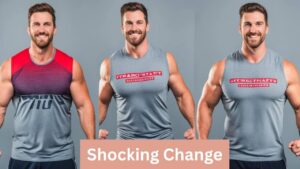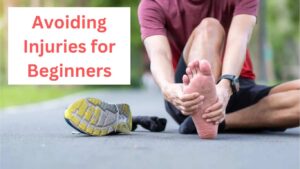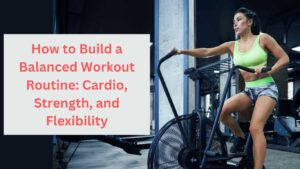When you’re starting out on your fitness journey, you might think that working out alone is enough to see progress. While exercise is essential for achieving fitness goals, nutrition plays an equally important role in helping you reach your full potential. The food you eat not only fuels your workouts but also helps your body recover, build muscle, and burn fat effectively.
In this article, we’ll cover the nutrition basics for fitness beginners, breaking down what you need to know to fuel your body for results. Whether you’re looking to lose weight, gain muscle, or just improve your overall health, proper nutrition is key to achieving lasting success.
Step 1: Understand Your Caloric Needs
The first step in building a nutrition plan for fitness is understanding your caloric needs. Calories are units of energy that your body uses to perform daily functions and exercise. To achieve any fitness goal, it’s crucial to know how many calories your body requires.

1. Calculate Your Total Daily Energy Expenditure (TDEE)
Your TDEE represents the total number of calories you burn in a day, considering both your resting metabolic rate (RMR) and your activity level. To calculate your TDEE, follow these steps:
- Calculate Your Basal Metabolic Rate (BMR):
BMR represents the calories your body needs at rest to maintain basic functions (like breathing and digesting food).
You can estimate your BMR using the Mifflin-St Jeor equation:- For women:
BMR = 10 × weight (kg) + 6.25 × height (cm) – 5 × age (years) – 161 - For men:
BMR = 10 × weight (kg) + 6.25 × height (cm) – 5 × age (years) + 5
- For women:
- Adjust for Activity Level:
Multiply your BMR by an activity factor to estimate your TDEE:- Sedentary (little or no exercise): BMR × 1.2
- Lightly active (light exercise 1-3 days/week): BMR × 1.375
- Moderately active (moderate exercise 3-5 days/week): BMR × 1.55
- Very active (hard exercise 6-7 days a week): BMR × 1.725
2. Create a Caloric Surplus or Deficit
Once you know your TDEE, you can adjust your calorie intake to fit your fitness goals:
- To lose weight: Aim for a caloric deficit (consume fewer calories than your TDEE).
- To gain muscle: Aim for a caloric surplus (consume more calories than your TDEE).
- To maintain weight: Consume calories equal to your TDEE.
A safe and sustainable calorie deficit or surplus is typically 250-500 calories per day.
Step 2: Focus on Macronutrients
The three primary macronutrients that should make up your diet are carbohydrates, protein, and fat. Understanding how to balance these macronutrients will help you achieve optimal performance and results.
1. Carbohydrates (Energy Source)
Carbohydrates are your body’s primary source of quick energy, especially during exercise. They break down into glucose, which fuels your muscles and brain.
- Healthy Carb Sources:
- Whole grains (brown rice, quinoa, oats)
- Fruits (berries, apples, bananas)
- Vegetables (sweet potatoes, spinach, broccoli)
- Legumes (lentils, chickpeas, beans)
- Why Carbs Matter:
- Fuel for Workouts: Carbs provide the energy needed for high-intensity workouts and endurance activities.
- Recovery: They help replenish glycogen stores after exercise.
- Recommended Intake: For active individuals, carbs should make up 45-65% of your total calorie intake.
2. Protein (Muscle Building)
Protein is crucial for muscle repair and growth, especially after strength training or intense physical activity. When you work out, especially with resistance exercises, you create small tears in your muscles, and protein helps repair these tears, making your muscles stronger.
- Healthy Protein Sources:
- Lean meats (chicken, turkey, lean beef)
- Fish (salmon, tuna, cod)
- Plant-based sources (tofu, tempeh, lentils)
- Eggs and dairy (Greek yogurt, cottage cheese)
- Protein powder (whey, plant-based)
- Why Protein Matters:
- Muscle Repair and Growth: Consuming enough protein helps your body rebuild muscle after exercise, making you stronger and more toned.
- Satiety: Protein also helps keep you full and satisfied, reducing cravings and promoting fat loss.
- Recommended Intake: For beginners, aim for 0.8–1.2 grams of protein per kilogram of body weight. For muscle gain, increase protein intake to 1.2–2.0 grams per kilogram.
3. Fats (Hormonal Balance and Recovery)
While fat often gets a bad reputation, it’s a vital nutrient for overall health. Fats support hormone production (including those involved in muscle growth and fat loss), help absorb fat-soluble vitamins (A, D, E, and K), and provide energy for low-intensity exercise.
- Healthy Fat Sources:
- Avocados
- Nuts and seeds (almonds, chia seeds, flaxseeds)
- Olive oil and coconut oil
- Fatty fish (salmon, mackerel, sardines)
- Nut butters (peanut butter, almond butter)
- Why Fats Matter:
- Hormonal Health: Healthy fats play a role in producing essential hormones that regulate metabolism, muscle growth, and recovery.
- Energy: Fats provide a long-lasting source of energy for your body, especially during low-to-moderate-intensity activities.
- Recommended Intake: Fats should make up around 20-35% of your total calorie intake.
Step 3: Micronutrients and Hydration
In addition to macronutrients, your body also needs micronutrients (vitamins and minerals) and adequate hydration for optimal performance and recovery.
1. Micronutrients (Vitamins and Minerals)
Micronutrients are crucial for immune function, energy production, and muscle function. Key micronutrients for fitness include:
- Vitamin C (supports immune function and collagen production)
- Vitamin D (important for bone health and muscle function)
- Calcium (supports bone health)
- Iron (important for oxygen transport in the blood)
- Magnesium (supports muscle function and recovery)
You can get these micronutrients from a varied diet of fruits, vegetables, whole grains, lean proteins, and dairy.
2. Hydration (Water)
Staying hydrated is essential for optimal performance and recovery. Water helps regulate body temperature, transports nutrients, and eliminates waste. Dehydration can lead to fatigue, cramps, and decreased workout performance.
- Hydration Tips:
- Drink at least 8 cups (64 oz.) of water daily, but more if you’re active.
- Consume electrolytes (found in sports drinks or coconut water) during longer workouts or after intense exercise to replace lost minerals.
- Drink water before, during, and after your workout to maintain hydration.
Step 4: Meal Timing and Frequency
While the quality of food is paramount, meal timing can also affect your workout performance and recovery.
1. Pre-Workout Nutrition
- Goal: Fuel your workout with enough energy, especially if you’re doing high-intensity cardio or strength training.
- What to Eat: A small meal with carbs and protein about 30-60 minutes before exercise.
- Example: Banana with peanut butter, Greek yogurt with berries, or a whole grain toast with turkey slices.
2. Post-Workout Nutrition
- Goal: Replenish glycogen stores and repair muscle tissue after exercise.
- What to Eat: A meal with protein and carbs within 30-60 minutes post-workout.
- Example: Grilled chicken with quinoa and veggies, or a protein shake with a piece of fruit.
3. Meal Frequency
There’s no need to eat 6 meals a day unless it suits your lifestyle. You can stick to 3 main meals with snacks in between to ensure you meet your calorie and macronutrient needs.
Step 5: Consistency and Sustainability
The most important aspect of nutrition is consistency. Building a sustainable and enjoyable nutrition plan will help you maintain energy levels, support your workouts, and fuel long-term results.
- Focus on whole, nutrient-dense foods and avoid overly processed options.
- Practice portion control and track your meals if needed to stay on track with your goals.
- Stay patient — results will take time, but with consistent effort in both your workouts and nutrition, you’ll see progress.
Conclusion
Nutrition is the cornerstone of any successful fitness journey. As a fitness beginner, focusing on a balanced diet with the right mix of macronutrients, micronutrients, and proper hydration will fuel your workouts, enhance recovery, and help you achieve your fitness goals. Remember to listen to your body, adjust your nutrition plan as needed, and prioritize consistency. With time, the right nutrition will become second nature and will support lasting fitness results.




